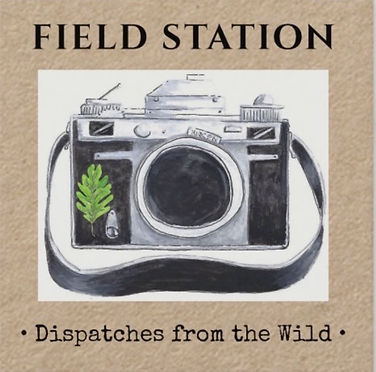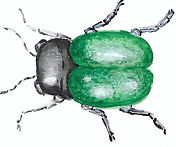




"Our species needs, and deserves, a citizenry with minds wide awake and a basic understanding of how the world works."
~Carl Sagan
[
]
Become a
Citizen Scientist!

Citizen Science
What is Citizen Science?
If you enjoy nature, why not get involved in a project that helps us understand more about it? Citizen Science is the voluntary involvement of everyday people in the conducting of scientific research. They design experiments, collect data, and analyze results. Mostly they are involved in the collection of data that helps professional scientists answer scientific questions and solve important problems. Projects can range from mapping pictures of the night sky, working on digitizing vast scientific collections, or playing games so scientists can observe how the brain works. There are over 3,000 ongoing projects to date. Citizen Science helps connect people meaningfully to science, promotes science literacy, and helps people feel more engaged in their communities and with the concerns that are important to them. One does not have to have any experience in science to become a Citizen Scientist.
Thee are many ways we benefit from Citizen Science. Scientists are able to harness the capability of the crowd, utilizing very large data sets in their experiments that they wouldn't ordinarily be able to obtain without more time and resources. This makes for more precise, open, and reliable results. Science can go further faster. In a sense it also democratizes science. People get involved in the issues they care about and this promotes greater understanding between the scientific community and the issues that are most important to people.

How can I get involved?
Are you thinking about getting involved in Citizen Science? There are so many different ways you can connect to a project, whether it be online and working from home, collecting data in your own back yard, or being hands-on and working with others in your community. The first step is to figure out what your interests are and the type of involvement you would like to have. Ask yourself what you care about, what type of work you would find enjoyable, and whether you want to connect with others. Below are great resources for finding a project that is right for you if you live in Northeast Indiana. These are some of the top organizations in citizen science, but this is by no means an exhaustive list.




Resources for Citizen Science in Indiana
There are many organizations involved in scientific research where they are asking for help from citizen scientists right here in Indiana. Some are government organizations, museums, universities, or scientific associations. Some sites listed below are clearinghouses for projects from all over the world. Go to their site for specific information on ongoing projects.
National and International
Citizen Science.gov- a database providing a government-wide listing of citizen science projects across federal agencies.
Citizen Science Association- A membership-driven organization that works to advance the field of citizen science.
National Park Service- Citizen Science Projects for the National Park System, including Indiana Dunes National Park.
National Oceanic and Atmospheric Service- Citizen Science Projects for marine environments, some which include online and gps tracking from anywhere in the world.
National Geological Survey- Projects with hydrology, birds, streams, and mapping, among many others that include local monitoring and involvement, uses Nature's Notebook.
NASA- Citizen Science Projects related to solar system and planetary science as well as observations of earth from space, projects from anywhere in the world.
National Science Foundation- Connects people to projects across many science disciplines in conjuntion with many science research partners.
iNaturalist- California Academy of Science and National Geographic- A Citizen Science project about the biodiversity of living things from all over the world.
Cornell Lab of Ornithology- Projects that gather data about bird populations, nesting, and migration, uses eBird, projects for anywhere in the world.
National Audubon Society - Projects that involve gathering data on birds, including the oldest running citizen science project, the Christmas Bird Count.
National Geographic Society- Citizen Science projects involving conservation science and geography that seeks involvement from anywhere in the world.
Scientific American- Science and exploration publication that showcases citizen science projects from all over the world.
Earth Watch- Team-based and researcher-assisted field science that involves wildlife ecology expeditions and home-based citizen science projects.
The Smithsonian Institution of Research- Citizen Science Projects in conjunction with universities and other entities that focus on ecological and fossil research as well as digitizing museum collections through the Smithsonian Transcription Center, projects open to anyone in the world.
The Field Museum- Citizen Science Projects at this Natural History Museum in Chicago *not far from Indiana* that involve digitizing museum collections, and ecological biodiversity data collection.
American Association of Zoos and Aquariums- Projects are concerned with wildlife conservation efforts and include
projects throughout the country.
FrogWatch USA- a citizen science program of the Akron Zoo that invites individuals and families to learn about the wetlands in their communities and help conserve amphibians by reporting data on the calls of local frogs and toads.
WeDigBio- An organization that focuses on the digitization of biocollections throughout the world, virtual and in-person events.
Zooniverse- One of the most prominent clearinghouses of Citizen Science Projects in the world that connects people to all kinds of ecological research projects, virtually or in person.
Sci Starter- One of the most prominent clearinghouses for Citizen Science Projects, is supported in part by the National Science Foundation.
AnecData- A clearinghouse for Citizen Science projects across a broad spectrum of topics that also includes social community discussion.
Indiana
City Nature Challenge- A project through the California Academy of Sciences and the Natural History Museum of Los Angeles, promoted by science agencies in Indiana that is a 4-day global bioblitz in April that seeks citizen scientists to document wildlife in their cities, uses iNaturalist.
Audobon Society Great Lakes Region- Projects involve research in conjunction with the Bird Conservation Network. Community science seeks to share information about the conservation of birds.
Purdue Extension- Citizen Science projects about agricultural and plant research.
Indiana University- Citizen Science projects that include ecological monitoring, such as Hoosier Riverwatch and Project Budburst.
IU Herbarium-A call to document and digitize Indiana's flora, seeking photos for a 5-year project beginning in 2019.
Indiana Phenology- Project seeks to gain seasonal information about leafing, flowering, and fruiting from our own backyards using Nature's Notebook.
Indiana Department of Natural Resources- Volunteering in the monitoring of fish and wildlife.
Northeast Indiana
Riverfront Fort Wayne- Various programs on the riverfront that have ongoing citizen science projects that include wildlife monitoring, invasive species management, and cleanups.
IDEM Hoosier Riverwatch- Organization that involves citizens in watershed assessment and water quality.
ACRES Land Trust- A member-supported non-profit organization dedicated to promoting land stewardship in Northeast Indiana and Ohio, volunteer opportunities available.
Little Rivers Wetlands Project- Restores and protects wetlands in the historic watershed of the Little River (a major tributary of the Wabash River), and provides educational opportunities that encourage good stewardship of wetlands and natural ecosystems, volunteer opportunities and citizen science projects available.